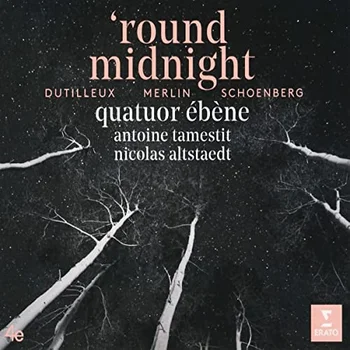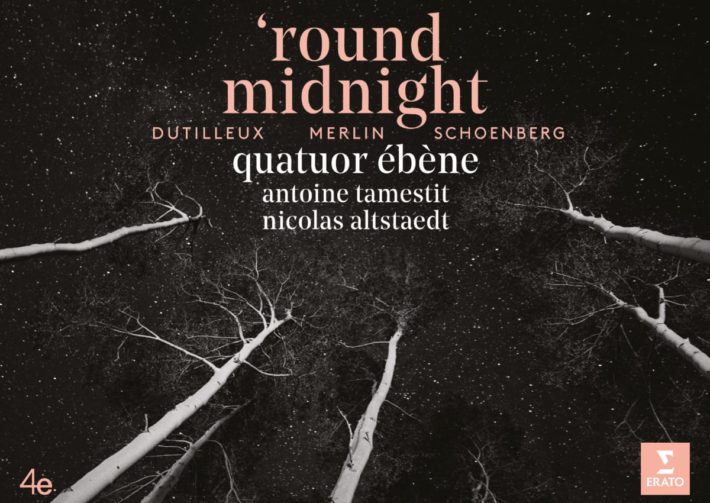After the well-received Beethoven Around the World, Quatuor Ébène’s newest venture veers around the bend to a very different place: a series of contemporary works revolving around the theme of night. The conception of ’round midnight started back in 2015 and the end product features works by Dutilleux and Schoenberg. Night Bridge, a composition by the group’s own cellist, Raphaël Merlin, does just as the title suggests, connecting the aforementioned selections with some jazz and film inspiration thrown in.

Dutilleux’s Ainsi la nuit is a bold choice to start with, as it introduces us to a most sinister aspect of night. A myriad of textures plays to an element of suspense with prickly pizzicatos (the quartet’s are particularly well-defined), jarring chords, and haunting phrases. While the work may not be everyone’s cup of tea, the performance offers a striking clarity that speaks to each instrumentalist’s attention to detail.
For all its atonality, if we listen closely enough, we can pick up on motivic patterns that tie different voices together. In Nocturne 1 (track 2), the harmonics that appear in the cello are echoed in the second violin in an eerie dialogue. Specifics aside, what the performers achieve holistically is to bring out the movement’s unpredictability. Small flutters of notes suddenly erupt into strident chords, which disappear just as mysteriously (0’38” – 1’13”). Another standout movement is Litanies 2 (track 8): the opening line of the upper strings carries the vestiges of a ghostly romanticism. A brief, impassioned moment in the middle (1’54”-2’07”) melts away into a dark conclusion; the quartet evokes the nuances of disquietude within the well-controlled soft dynamics.
Night Bridge’s immediate connection to the Dutilleux lies in its structure, though the musical material itself is somewhat more recognizable. It is not, however, without its twists and turns. Take on On Moon River 1 (track 14), for instance: opening with a coy quotation from the original song, it quickly descends into the ferocity of Parenthèse 1. On Moon River 2 (track 16) offers a melodic respite with its subtle charm before the return of a nervous Parenthèse 2. We would think the final Lever du jour (which translates into ‘sunrise’), would offer a more hopeful sentiment but it’s filled with an unease that the ensemble captures through piercing glissandi and chiling tremolos. While this might seem like a letdown, it’s a clever setup to the final work.
Schoenberg’s Verklarte Nacht addresses the conflict between anguish and assurance before finally pulling us toward the latter – a cathartic end to the album’s journey. (The group here enlists the help of violist Antoine Tamestit and cellist Nicholas Altstaedt). The later string orchestra arrangement may have ‘strength in numbers,’ a density of sound capable of sweeping us into the narrative; however, a good performance of the original sextet version can reveal something more personal. Quatuor Ébène’s performance has a distinctly raw quality in its most extreme moments; This honesty is indeed effective in a piece where mere refinement will simply not do. The opening growl of the cellos in Sehr Langsam (track 24) call to mind the creaking of the “tall oaks” in the poem upon which the work is based. The entrance of the higher strings moments later is plaintive but adds a little extra with a desperate poignancy. And in a vivid reflection of the positive turn in the story, the performers grasp the hope that quickly evolves into impassioned yearning in Etwas bewegt (track 30). The brightness of the violin is made all the more captivating by the pronounced restlessness of the middle voices.
The generous liner notes put the quartet’s creative process front and center, which is nice. However, scattered references to the works lack a sense of organization that would enable a full appreciation of the artists’ insights. The sound engineering is more successful, bringing the performers up-close without making us feel confined to a small performance space – a real boon in works as nuanced as these.
The artists write that night robs us of our eyesight, thus changing the perspective of the world around us. Some of the more esoteric works in ’round midnight do a similar thing: in the absence of familiarity and expectation, our ears are encouraged to seek a new dimension in the music.
Recommended Comparisons
Ébène (Debussy/Ravel) | Ébène (Schubert) | Juilliard Quartet | Related Album
’round midnight
Quatuor Ébène
Warner Classics / Erato, CD 9029664190



















